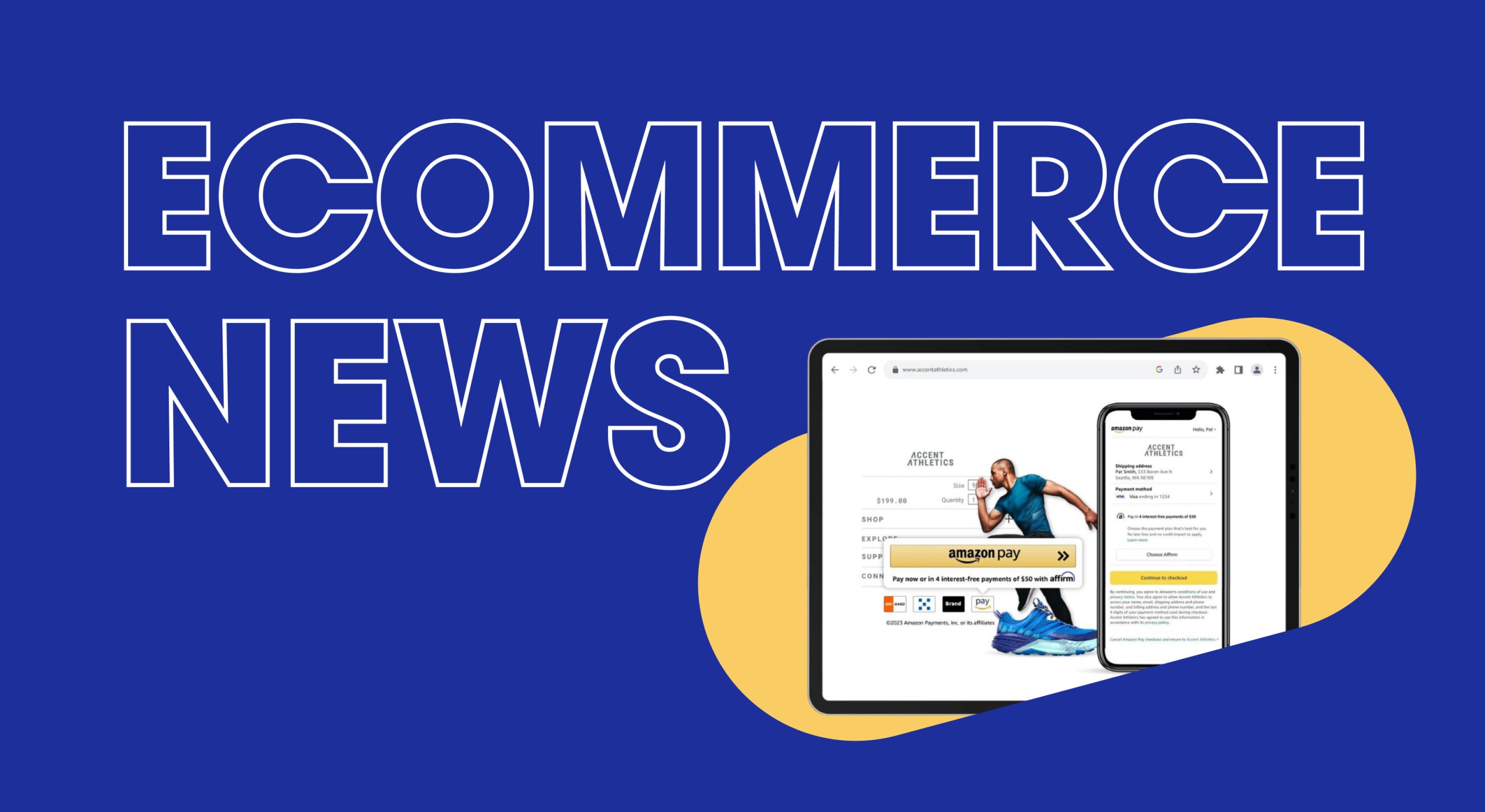AI in ecommerce: a friend or a foe?
That’s the controversial question that has haunted sellers and marketers ever since the tech entered the ecommerce world. Today, we’ll try to help you answer that through juicy slices of news about ecommerce technology.
- Technology-driven legal issues 🤖
- Your AI-less success story 🫵
- AI-generated UGC 🤳
- Amazon’s AI-powered ways ⚡

BLACK MARKET
Running an online business isn't just about great products. The legal landscape is a big part of the game. And because technology keeps on changing it, it’s crucial to keep up with the changes is crucial to avoid potential legal pitfalls.
While it’s wise to have a lawyer in your corner, Business.com highlights 5 legal issues you should be familiar with.
1. Liability and contractual information
Even big players like Amazon aren’t immune to this issue. Back in 2019, they faced legal heat when a dog collar sold by a third-party vendor caused permanent vision loss to a customer.
It was a wake-up call for all to clarify product liabilities and warranties, especially with third-party vendors. A little upfront effort can save you from legal headaches.
🛡️ How to dodge this bullet:
- Provide crystal clear terms of use, especially if you’re selling third-party products.
- Disclose product liabilities and how customers can return or cancel their purchases.
2. Data protection and privacy
Collecting customer data is a standard practice in business. However, businesses carry the responsibility of protecting it.
Transparency is key here—not just because it’s the law but because it builds strong consumer trust.
🛡️ How to dodge this bullet:
- Draft clear data protection and cookies policies and display them prominently on your site.
- Always get explicit consent before collecting personal data.
- Provide a way for customers to opt out of having their data accessed.
3. Fraud and electronic transaction security
Online payment fraud is predicted to hit $13.73 billion by 2024. Besides keeping customer info secure, you need robust fraud prevention measures to avoid hefty fines and reputation damage.
FYI: If your site gets hacked, you’re legally required to inform your customers and the public. Most states in the U.S. give you 45 days to do this, but it varies, so know your local laws.
🛡️ How to dodge this bullet:
- Implement application performance management to maintain system security and detect issues before they escalate.
4. Intellectual property infringement
Using someone else’s intellectual property— intentional or not—can lead to costly lawsuits. You must be extra careful on this one, as you can still face claims even if you cite the source.
🛡️ How to dodge this bullet:
- Create your content or ensure you have the rights to use what you’re using.
- Treat all external work as copyrighted unless specified otherwise.
- Regularly audit your site for potential intellectual property issues.
5. Unauthorized resellers
Unauthorized resellers are like weeds in your garden. They can undercut your prices and damage your brand.
🛡️ How to dodge this bullet:
- Register your trademark and track online platforms for unauthorized sales.
- If you find any, test-buy from them to gather evidence and take legal action if necessary.
⚖️ Stay legal, stay profitable
Running an ecommerce business requires playing by the rules. Feel free to leverage every bit of technology out there to grow your brand—but carefully and legally.

TOGETHER WITH WALMART MARKETPLACE
You don’t need AI to generate your success story

Tired of limited reach and high fees?
It's time to tap into millions of eager customers with Walmart Marketplace!
For a limited time, new sellers on Walmart Marketplace get:
- Up to 50% off on referral fees for three months;
- Up to 50% off on Walmart Fulfillment Services*; and
- Instant access to powerful sales tools like advertising and competitive pricing!
Be the next success story on Walmart.com!
How did Miko grow by 115% GMV in just one year?*
By leveraging the 2-day shipping of Walmart Fulfillment Services to increase GMV by 1573%* on items that did not previously have 2-day shipping!
Ready to be the next Miko? Start selling now and get up to 50% off on referral and fulfillment fees.**
Unlike other platforms, Walmart Marketplace offers:
- ZERO monthly or setup fees
- Unmatched transparency—clear, competitive fees with no hidden costs.
- The unique omnichannel advantage that lets you tap into millions of customers across their online and physical stores.
Sign up today and claim your exclusive savings!
*Source: Walmart first-party data, 2021-22

BITES OF THE WEEK
- New Tools Alert: Here are some new AI tools you can explore to market your brand and products
- From E to C: There’s a tech tool for all your needs—from ecommerce selling to customer service.
- Absolutely Right: Research revealed that AR tops new ways of shopping.
- A Refresher: ICYMI, here’s our take on leveraging AI for your business.

HOT TOPIC
Is AI-generated UGC a game-changer or deal-breaker?

Last March, a viral short-form video ad sparked industry-wide conversation. The ad featured a woman in a car discussing body odor and deodorants.
What’s controversial about it?
It was entirely AI-generated! Business Insider shared the impressions it garnered from those who saw it.
➗ Divided stance
- Enthusiasts:
- Will Sartorius, CEO of SelfMade, quickly partnered with AI developers due to the streamlined creativity this innovation offers. Working with UGC creators takes months, but with AI, it's down to just 30 minutes at most.
- Some influencers like Ariel Marie, whose face inspired the AI-generated ad, don’t think it will significantly impact their careers.
- Skeptics:
- Vic Banham, CEO of Antler Social, worries that if AI involvement isn't disclosed, it could damage the trust between brands and consumers.
- Micro-influencers are concerned about fair compensation and the potential for brands to exploit creators.
🚥 Road ahead
Despite the buzz, industry experts stress that humans are still essential in the creative process. AI boosts efficiency, but it won't replace real people anytime soon. Authentic human storytelling in advertising remains irreplaceable, even as AI takes on a bigger role.

SELLER REFRESHER
How Amazon uses AI to deliver personalized shopping experiences

Since 2021, Amazon has been the top apparel retailer in the U.S. But that’s somehow expected since the retail giant uses AI to reshape the fashion industry and enhance customer experiences.
🧠 Technology Magazine details how Amazon does it and how you can replicate it for your brand.
- AI-powered size recommendations. Amazon uses AI and machine learning models to provide better size recommendations on product pages.
- How to replicate it: Leverage similar technology to analyze customer data, including size preferences and product reviews. This will enhance the accuracy of your recommendations for any type of item.
- Fit Review Highlights. Amazon offers AI-generated Fit Review Highlights to help customers find the right fit based on their recommended size. 📏
- How to replicate it: Use an AI tool that can extract and summarize customer feedback to provide personalized guidelines.
- Visualized clothing size charts. Amazon leverages AI to present size information in a visually engaging manner. This enhances the accuracy and usefulness of size charts.
- How to replicate it: Find an AI tool that can visually present product information. This would help customers assess if the specs fit their requirements.
- AI Fit Insights Tool. Amazon's Fit Insights Tool helps brands understand why items are returned and provides actionable insights to improve product offerings. 📦
- How to replicate it: Invest in an AI tool that can provide and analyze comprehensive return feedback to help you improve what needs to be improved.
AI makes it possible
Amazon is indeed miles ahead in providing tailored experiences for its customers. If this success story doesn’t convince you to embrace AI-driven solutions, we don’t know what will.








